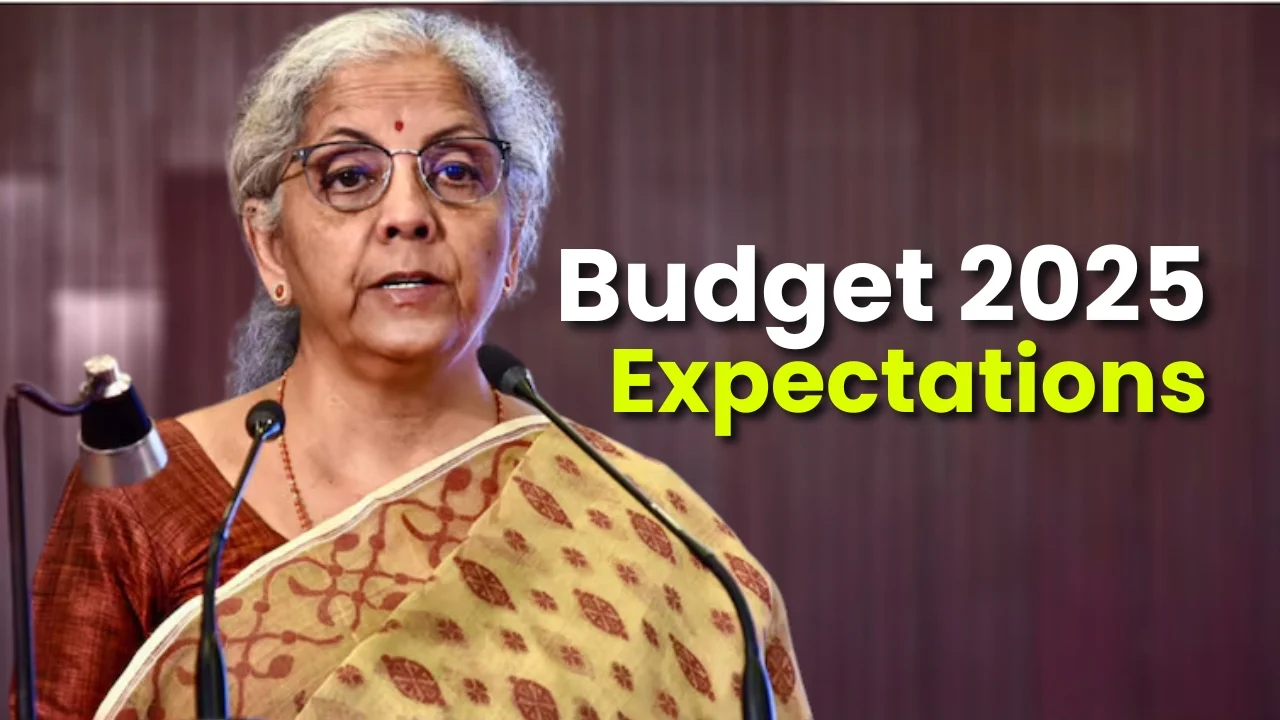The Union Budget 2025, set to be presented by Finance Minister Nirmala Sitharaman on February 1, 2025, is one of the most anticipated financial events of the year. With economic growth, tax reforms, and sectoral development in focus, experts expect major announcements that will shape India’s financial roadmap for the fiscal year 2025-26.
What Are Union Budget 2025 Expectations?
As India aims to become a $7 trillion economy by 2030, Union Budget 2025 expectations are to balance fiscal consolidation with investments in infrastructure, agriculture, healthcare, and digital transformation. The stock market is also keenly watching how various industries will be impacted.
Income Tax Reforms: What to Expect?
One of the biggest areas of speculation is income tax changes. Many expect the basic exemption limit under the new tax regime to be raised from ₹3 lakh to ₹5 lakh, benefiting middle-class taxpayers. Additionally, the government may introduce a zero tax rate for individuals earning less than ₹10 lakh annually.
Below is a summary of expected tax slab changes:
| Income Slab (₹) | Current Tax Rate (%) | Expected Tax Rate (%) |
|---|---|---|
| 0 – 5 Lakh | 0 | 0 |
| 5 – 10 Lakh | 10 | 5 |
| 10 – 15 Lakh | 20 | 15 |
| 15 – 20 Lakh | 30 | 25 |
Experts also predict an increase in standard deductions under the new tax regime, higher exemptions for housing loan interest (from ₹2 lakh to ₹5 lakh), and simplified long-term capital gains (LTCG) tax rules.
Infrastructure & Economic Growth
To support economic expansion, the government is likely to increase capital expenditure (CAPEX) on roads, railways, and urban development. Public-Private Partnerships (PPP) are expected to play a major role, particularly in transportation, smart cities, and digital connectivity.
The stock market will closely track CAPEX allocations, as infrastructure growth directly impacts sectors like cement, steel, and logistics. A focus on green projects such as solar energy and offshore wind farms is also expected.
Agriculture Sector: Boosting Rural Growth
The agricultural sector plays a crucial role in India’s economy, and Budget 2025 is expected to introduce key reforms in Minimum Support Price (MSP), subsidies, and credit facilities.
| Area of Focus | Current Status | Expected Change in Budget 2025 |
|---|---|---|
| Agriculture Budget | ₹1.52 lakh crore | ₹1.75 lakh crore (15% increase) |
| Kisan Credit Card Limit | ₹3 lakh | ₹5 lakh |
| MSP Coverage | 23 crops | Possible expansion |
Additionally, the government may introduce tax incentives for agri-tech, subsidies on organic farming inputs, and increased crop insurance coverage under PM Fasal Bima Yojana.
Healthcare: Strengthening India’s Medical Infrastructure
Healthcare experts are demanding a higher budget allocation of 2.5% to 3% of GDP, up from the current 1.8%. This would ensure better rural healthcare infrastructure, AI-based diagnostics, and expanded telemedicine services.
A key demand is the reduction of GST on health insurance premiums from 18% and an increase in tax deductions under Section 80D to make medical insurance more affordable. Additionally, the government may invest in mental health programs and encourage domestic pharmaceutical R&D.
Green Energy & Electric Vehicles (EVs)
With India’s push towards net-zero emissions by 2070, the Union Budget 2025 expectations are to allocate higher funds for renewable energy projects, electric vehicles (EVs), and green hydrogen production. The GST rate on EVs and batteries may be lowered to boost adoption.
| Sector | Current Budget | Expected Budget |
|---|---|---|
| Solar & Wind Energy | ₹30,000 crore | ₹45,000 crore |
| Green Hydrogen | ₹19,700 crore | ₹25,000 crore |
| EV Subsidies | ₹10,000 crore | ₹15,000 crore |
Real Estate: Homebuyers Expect Relief
To boost the housing sector, experts predict a higher tax exemption limit on home loan interest from ₹2 lakh to ₹4 lakh. The government may also offer subsidies for first-time homebuyers and lower GST on construction materials.
A dedicated Affordable Housing Scheme with additional incentives for low-income families is also expected.
Retail & MSMEs: Supporting Business Growth
Retailers and MSMEs are hoping for lower GST rates on essential goods, a National Retail Policy, and expanded digital infrastructure for small businesses.
| Key Demand | Expected Budget 2025 Announcement |
|---|---|
| Income Tax Exemption | Increase from ₹2.5 lakh to ₹3.5 lakh |
| Standard Deduction | Increase from ₹50,000 to ₹75,000 |
| GST on Essential Goods | Possible reduction |
| MSME Credit Support | Expansion of credit guarantee schemes |
Stock Market & Investor Expectations
Markets will watch for changes in corporate tax rates, capital gains tax, and dividend taxation. Any increase in government spending on infrastructure and green energy could boost sectors like cement, steel, and renewable energy.
Additionally, the government may simplify stock market taxation, including LTCG tax rules for mutual funds and real estate investments.
Conclusion
The Union Budget 2025 expectations are centered around tax relief, infrastructure spending, agricultural growth, healthcare investment, and sustainability initiatives. With the economy recovering post-pandemic, this budget could be a turning point for multiple industries.
As the country waits for the final announcements on February 1, 2025, all eyes are on Finance Minister Nirmala Sitharaman to see how the government balances fiscal discipline with economic growth.
